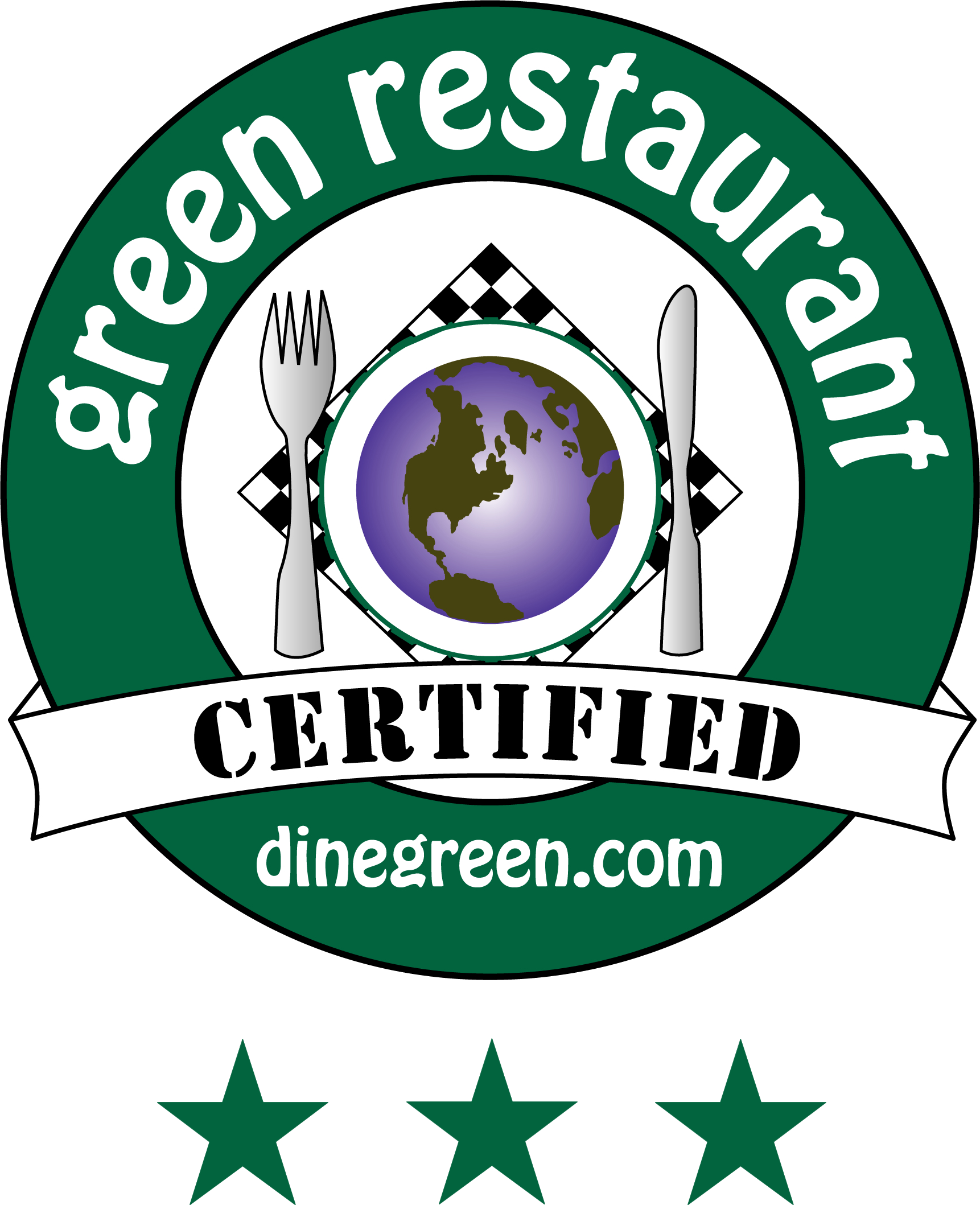Material Flows
Zero Waste at Bates
Just as Bates reached our goal of becoming carbon neutral, we also have a goal of moving towards becoming a Zero Waste campus. If this sounds impossible, consider this: our Dining Services has already achieved an over 80% diversion rate, which means that they are composting or recycling the vast majority of their waste stream.
Here are some ways that we hope to meet our goal:
- Capture food waste campus-wide. Food waste represents a huge amount of embodied energy and nutrients that are lost forever when thrown into a landfill. We have begun piloting a campus-wide food waste collection in order to compost these organics. In addition to being a better environmental alternative, it is also half the cost.
- Standardize! We have begun deploying user-friendly recycling/compost/trash bins which will make it easier for folks to do the right thing. We have also been standardizing all waste and recycling signage on campus.
- Procurement. Working with our vendors to eliminate packaging on the front end helps our efforts with waste disposal.
- Gather data. Though it sounds a bit onerous, gathering data on our waste streams lets us know the most important thing of all – are our efforts working?
Single-Stream Recycling
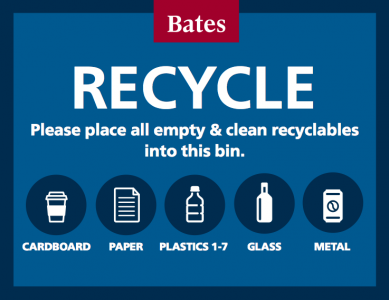 Bates College collects recycling internally and sends it to a single-stream recycling facility. Single stream recycling allows us to use one bin to collect all recyclable materials:
Bates College collects recycling internally and sends it to a single-stream recycling facility. Single stream recycling allows us to use one bin to collect all recyclable materials:
- all glass bottles
- paper and cardboard
- plastics #1-7
- metal cans
Click here for more information about waste sorting at Bates.
Compost
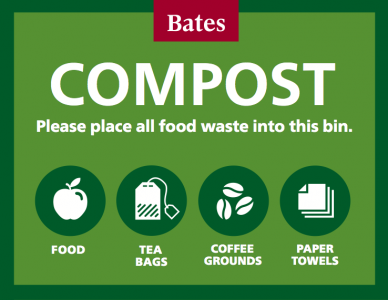 We are in the midst of piloting a food waste collection pickup for campus. By partnering with a local composter called We Compost It, we have begun taking steps to eliminate food waste heading to the landfill. Bates currently collects food waste at the Commons, the Den, Pettengill, 280 kitchen, Chu, Kalperis, Hedge, Roger Williams, BSC, and the Ronj. Additionally, the compost pickup can accept paper towels and napkins as well.
We are in the midst of piloting a food waste collection pickup for campus. By partnering with a local composter called We Compost It, we have begun taking steps to eliminate food waste heading to the landfill. Bates currently collects food waste at the Commons, the Den, Pettengill, 280 kitchen, Chu, Kalperis, Hedge, Roger Williams, BSC, and the Ronj. Additionally, the compost pickup can accept paper towels and napkins as well.
Liquids
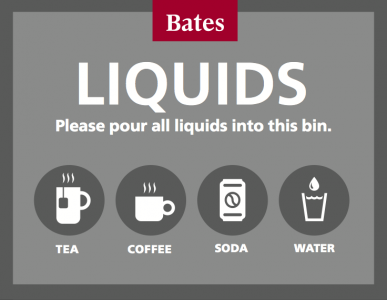 In some areas where liquid waste generation is high, we have provided collection stations for capturing liquids as well. This is done for two reasons:
In some areas where liquid waste generation is high, we have provided collection stations for capturing liquids as well. This is done for two reasons:
- Liquids are heavy, and we have to pay per ton for our trash. We can significantly reduce our costs by eliminating liquids from our trash cans.
- Liquids ruin everything. When thrown into recycling, they render the recycling unusable, and when thrown into the trash, they create a huge mess.
Landfill
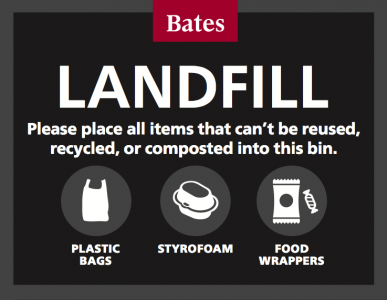 Items that cannot be diverted into another stream end up in the landfill. They represent a loss of resources and embodied energy, and we are working to reduce this stream as much as possible.
Items that cannot be diverted into another stream end up in the landfill. They represent a loss of resources and embodied energy, and we are working to reduce this stream as much as possible.
What Else Do We Recycle?
Electronics
Bates recycles 100% of its electronic equipment. As the College cycles through its process for updating computers on campus, all replaced equipment is sent to eWaste Alternatives, a non-profit organization that collects computers, peripherals, and other electronics for reuse and recycling. eWaste Alternatives refurbishes and retrofits as much as possible of the equipment it receives and donates the updated equipment to PCs for Maine. PCs for Maine makes the refurbished computers available to individuals with disabilities, residential and community support services for adult education programs, and municipalities for employment training.
Check out the eWaste Alternative Video!
What can be done with obsolete CDs, DVDs, Microfilm and Microfiche?
Old CDs, DVDs, Microfilm, and Microfiche and other electronic-related items owned by Bates may be recycled by calling Bates Environmental Health and Safety at 207-786-6413.
Can personal computers and other electronic components be recycled at Bates?
Yes. The Office of Environmental Health & Safety (EH&S) offers an annual recycling program for Bates Staff typically held during the month of June. Look for emails announcing the event.
Light bulbs
Compact Fluorescent light bulbs (CFLs) use 75 percent less energy than incandescent bulbs and can last up to four years. While considerably more energy efficient, these light bulbs contain trace amounts of mercury. Though we are phasing these out in favor of LEDs, there are still quite a few around campus.
To recycle your CFLs, please give them to your building custodian.
The Office of Environmental Health & Safety (EH&S) manages the recycling of all mercury containing products at Bates. If a CFL bulb should break in a dorm room or office space, please contact the EH&S Office at 786-6413 for clean-up guidance.
Batteries & Cell Phones
Bates has 3 collection sites for rechargeable batteries and cell phones on campus. Check out what the types of acceptable batteries are.
- Chase Hall (outside the Bookstore)
- Ladd Library (adjacent to the Lost & Found)
- Pettengill Hall (at the Reception desk)
Grease
Our Dining Hall produces over 16 tons of brown grease every year. Brown grease is essentially waste vegetable oil and animal fats that often clog sewers and drains. Traditionally, it is sent to waste water treatment plants where it is a major impediment their operations and is generally considered a net negative contribution. At Bates, however, we send it to a methane digester in western Maine where it is composted in the absence of oxygen to produce natural gas and an organic fertilizer. The natural gas is then burned for energy.
We also produce used fry oil, which we send to a local biodiesel manufacturer to turn our used fry oil into biodiesel, a diesel fuel substitute which is renewable and has a much smaller carbon footprint than conventional fuel.
Clothing and Dorm Items – Bates Clean Sweep
At the close of each school year we cut down on end-of-the-year waste by holding a huge yard sale filled with items left behind by students and donated by the college and faculty/staff.
Every spring, volunteers from local non-profit organizations help us collect truckloads of donated items from student residences. All the items are cleaned, sorted, and priced for a huge, one-day yard sale in late June. All the proceeds from the event go to participating non-profits in the local community.
Learn more about Clean Sweep!
Procurement
We are working internally to produce a comprehensive procurement policy for our vendors, one that highlights the sustainability initiatives of vendors as well as encouraging them to work to reduce packaging and consider end-of-life protocols for their products. More to come.
Dining Services
Bates’ Dining Services has become a model of environmental stewardship and has successfully created a system that conserves both water and energy and diverts a majority (over 80%) of its waste from the solid waste stream.
Here are just some ways they do it:
- they develop close relationships with vendors such as Stonyfield Farm who are organic and also collect and recycle containers
- they’ve established a pre-consumer food waste composting program with a farm in Lisbon, ME
- they’ve established a post-consumer food waste program with a pig farmer in Poland, MECommunity outreach program which allows extra food portions prepared to be shared with local homeless shelters and soup kitchens
- they buy local and organic products when possible including Oakhurst milk as well as fresh and local fish, meat and produce
- they’ve been 3 star certified as a green restaurant since 2002. Read on at the link below:
Learn more about Bates College Dining Services
